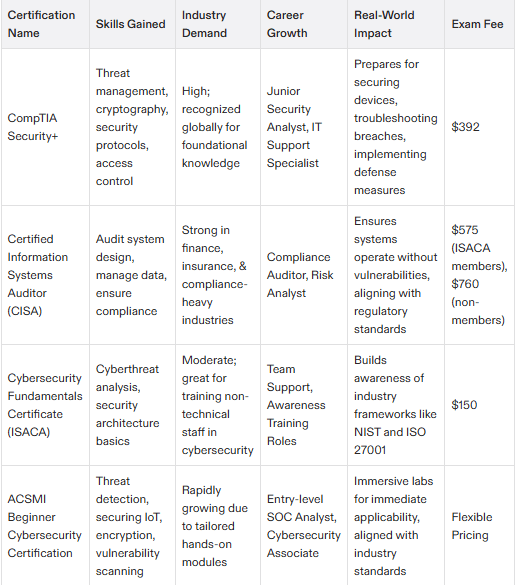Table of Contents
Entering the field of cybersecurity can feel overwhelming, but the right cybersecurity certification for beginners provides a strong foundation for success. With cyber threats on the rise, organizations are desperate for skilled professionals to protect their digital assets. No matter your background, starting with a beginner-friendly certification can open doors to exciting career opportunities across industries ranging from finance to healthcare.
This guide will walk you through the top beginner certifications, the benefits they offer, and how ACSMI’s comprehensive program can help you transition from a novice to a skilled cybersecurity professional.
Why Do Beginners Need Cybersecurity Certifications?
Cybersecurity certifications act as stepping stones for your career. Even if you lack technical experience, beginner-friendly certifications start you with essential knowledge, teaching you cybersecurity basics like system protection, malware detection, and data security. They provide structured training to ease you into this dynamic field and validate your skills, ensuring employers take notice.
Key Benefits of Certifications for Beginners:
- Quick Learning Curve: Certifications simplify technical concepts, building your confidence as you progress.
- Career Opportunities: They make your resume stand out in a competitive job market.
- Hands-On Knowledge: Many certifications integrate labs or simulations to prepare you for real-world challenges.
- Salary Boost: Entry-level cybersecurity roles typically pay $50,000 to $80,000—with room to grow quickly.
The Most Beginner-Friendly Cybersecurity Certifications in 2025
Choosing the right cybersecurity certification for beginners largely depends on your interests and career goals. Here are the top certifications designed for individuals with little to no experience.
1. CompTIA Security+
Why It’s Ideal for Beginners:
This certification is a gateway to cybersecurity fundamentals, providing solid expertise in areas like network protection, risk management, and incident response.
- Skills Gained: Learn about threat management, cryptography, security protocols, and access control.
- Industry Demand: Security+ is highly recognized by employers worldwide as the go-to certification for entry-level roles.
- Career Growth: After obtaining this certification, professionals often advance to roles like Security Analyst or Incident Responder.
- Certification Path: Requires no prior certifications, making it one of the easiest starting points.
- Real-World Impact: Security+ preps you to detect risks, troubleshoot breaches, and implement defense mechanisms.
- Exam Fee: $392
2. Certified Information Systems Auditor (CISA)
Why It’s Ideal for Beginners:
If you’re detail-oriented and interested in compliance, auditing, and systems, CISA offers focused knowledge in securing IT infrastructures.
- Skills Gained: Audit system design, manage sensitive data, and ensure regulatory compliance.
- Industry Demand: Trusted by auditing firms and organizations in heavily regulated industries like finance and insurance.
- Career Growth: Pathways include Compliance Auditor, Security Associate, and Risk Analyst.
- Real-World Impact: You’ll ensure systems operate without vulnerabilities, protecting businesses from costly breaches.
- Exam Fee: $575 ISACA members / $760 non-members
3. Cybersecurity Fundamentals Certificate (ISACA)
Why It’s Ideal for Beginners:
This introductory course delivers basic yet vital elements of cybersecurity, ideal for assessing whether you want to pursue a long-term career in the field.
- Skills Gained: Cyberthreat analysis, security architecture basics, and fundamental awareness.
- Industry Demand: Great for organizations training non-technical staff in cybersecurity.
- Career Growth: Opens doors to starter roles in team support and cybersecurity awareness training.
- Real-World Impact: Understand the basics of frameworks like NIST and ISO 27001.
- Exam Fee: $150
4. ACSMI cybersecurity certification for beginners
Why It’s Ideal for Beginners:
More than just a certification, ACSMI programs feature modular options with 400+ skill-specific courses that equip you with hands-on expertise across multiple domains.
- Skills Gained: Threat detection, securing IoT devices, file encryption, and vulnerability scanning.
- Industry Demand: With a unique blend of scalability (beginner to expert) and relevance, ACSMI is trusted globally for its practical training.
- Career Growth: SOC Analyst, Junior Cybersecurity Associate, and Threat Intelligence Intern are common starting roles.
- Real-World Impact: Comprehensive learning labs position you for immediate application of skills like incident response and network hardening.
- Exam Fee: Flexible pricing depending on depth of selected modules
Check out ACSMI’s cybersecurity certification for beginners to explore its hands-on approach and unparalleled module diversity.
5. ACSMI Introductory Cybersecurity Certification
Best for: Holistic training with over 400 modules tailored to beginners
- Overview: ACSMI offers a tailored entry route for aspiring professionals through its multi-module programs, encompassing foundational skills and niche specializations.
- Exam Fee: Flexible pricing
- Prerequisites: Ideal for those with no prior experience but eager to learn comprehensively.
- Career Path: Entry-level SOC Analyst, Incident Response Trainee, Cybersecurity Associate
- Salary Range: $60,000–$90,000 annually
- Real-World Applications: Provides a blend of online lectures and hands-on labs to build practical experience.
Explore ACSMI’s Comprehensive 400+ Module Program
The ACSMI curriculum redefines what “beginner” certifications can achieve. Its 400+ modules, including video tutorials and hands-on labs, allow you to gain expertise across cybersecurity domains like malware analysis, blockchain threats, and secure cloud computing.
Highlighted Modules for Beginners:
- Basic Networking: Covers data transmission protocols, firewalls, and VPNs.
- Threat Landscape 101: Identifies common hacking techniques and how to counteract them.
- Digital Forensics Fundamentals: Teaches evidence collection after a breach.
- Zero Trust Security: Aligns with emerging models for authentication and risk reduction.
Each module aligns with leading certifications and frameworks like ISO, NIST, and GDPR, preparing you for industry standards from Day 1.
How to Pick the Right Cybersecurity Certification
It’s essential to align your study path with your career ambitions. Here’s a quick guide to narrow your options:
- Seek Job Flexibility: Vendor-neutral certifications (like Security+) offer greater adaptability.
- Gauge Your Time Commitment: Some certifications take months to study; plan your schedule accordingly.
- Assess Learning Style: Hands-on lab testing (as in ACSMI) adds a practical edge compared to lecture-only certifications.
- Focus on Demand: CompTIA Security+ and ACSMI lead in employer recognition, making them great starting points.
- Analyze Cost vs. ROI: Beginner certifications often start low but yield significant salary hikes upon completion.
FAQs About cybersecurity certification for beginners
1. What’s the easiest cybersecurity certification for beginners?
CompTIA Security+ and ISACA’s Fundamentals Certificate are intuitive, step-by-step programs that require no prior IT knowledge.
2. Are certifications enough to get hired?
Certifications such as ACSMI or Security+ combined with practical knowledge (like internships or labs) make you highly marketable.
3. How soon will I see benefits after earning a certification?
Most entry-level certifications immediately result in stronger resumes and improved interview performance, often leading to job offers within months.
4. What makes ACSMI unique?
The scale (400+ modules), its alignment to global frameworks (e.g., NIST), and practical labs distinguish ACSMI from traditional certifications.
5. Are these certifications worth the investment?
Absolutely! Certifications may cost $300+, but entry-level salaries averaging $60,000+ provide amazing ROI.






